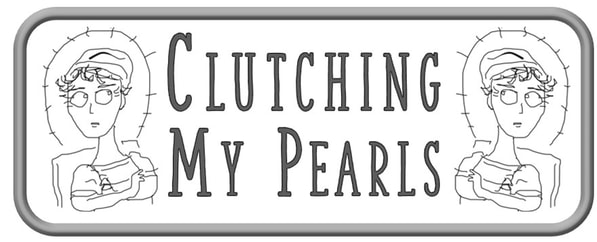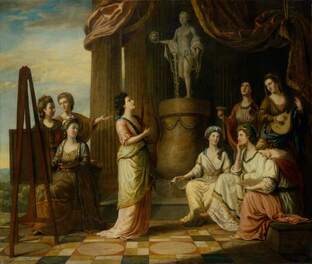| Clutching My Pearls is about Jane Austen and the times she lived in. The opinions are mine, but I don't claim originality. Much has been written about Austen. Click here for the first in the series. “[Mrs. Westbury], what has often been described, but can never be too often held up to derision—a female pedant, a female politician, a smatterer in philosophy, a perpetual controvertist.” -- Clarentine (1796), by Sarah Burney |
| Pride & Prejudice pokes fun at a lot of people and a lot of things. It bubbles with the high spirits of its author. We laugh at Mrs. Bennet but after all, she has every reason to be worried about the family's future. And what about poor, studious Mary, who is "mortified by comparisons between her sisters’ beauty and her own"? Some JAFF (Jane Austen fan fiction) authors have written novels centered around Mrs. Bennet or Mary Bennet; stories which treat them with insight and sympathy. For many readers, Mr. Bennet's insouciance about his family's financial future is harder to defend than Mrs. Bennet's anxiety. And it isn't Mary's fault that she's plain, that she occupies the unfortunate position of the middle child. We may regard Mary Bennet charitably today but Elizabeth never gives her the time of day and there's no indication that she's ever invited to Pemberley. Why does Mary get this callous treatment? Mary is a variation on a stock character of the Georgian and Regency period, the female pedant. (Let me pedantically explain that a pedant is someone who has, or who believes they have, superior knowledge and who likes to lecture or debate others. ("Well, ACKshually....")) The author Henry MacKenzie (1745-1831) remarked "The character of a female pedant, from Fielding downward, has been applauded in the closet [that is, in private reading] and on the stage..." | Instead of using the term "bluestockings," and besmirching the fair name of women intellectuals who did receive respect and fame in Georgian Britain, I will use the term used in the novels, "female pedant." The ladies portrayed above are: "Anna Letitia Barbauld (1743–1825), poet and writer; Elizabeth Carter (1717–1806), scholar and writer; Elizabeth Griffith (1727–1793), playwright and novelist; Angelica Kauffmann (1741–1807), painter; Charlotte Lennox (1720–1804), writer; Catharine Macaulay (1731–1791), historian and political polemicist; Elizabeth Montagu; Hannah More (1745–1833), religious writer; Elizabeth Ann Sheridan (née Linley)," singer and writer. More about the Bluestockings in this BBC "In Our Time" podcast. |
While we don't read about Mary studying Latin and Greek, we are told she reads "great books" and likes to quote them to the family.
There are other characteristics about Mary which fit the stereotype of female pedant as they were portrayed in 18th century novels and plays.
 Mary delights us long enough. Lucy Briers in the 1995 mini-series
Mary delights us long enough. Lucy Briers in the 1995 mini-series Author Sarah Burney put female pedants in her novels Clarentine and Traits of Nature. Mrs. Westbury in Clarentine (1796) "set up for a female critic" late in life, "in the failure of youth and beauty... and though on a different score, was still by many fools admired, and by many wise men, for the sake of peace, applauded." Likewise, Austen tells us Mary Bennet is "impatient for display" of her musical skills.
As I mentioned in my previous post, 18th century stock characters don't always have a role to play in the plot, apart from being there to be laughed at, or being set up as a contrast with the heroine. Mary Bennet exists as a contrast to the frivolity of Kitty and Lydia and the three sisters together are contrasted to the intelligent, sensible heroines Elizabeth and Jane. But Mary doesn't have a notable effect on the plot in Pride & Prejudice. She sometimes comments on the action and she's one of the reasons Elizabeth feels so humiliated at the Netherfield ball. That's about it. In the 1967 adaption, she does not even appear.
Neither do Sarah Burney's female pedants play a big part in the books in which they appear. In Clarentine, Mrs. Westbury plays no role at all. Clarentine merely visits her salon.
“Clarentine, as she entered, beheld [Mrs. Westbury] sitting before a large table, covered with books, pamphlets, papers, pens and inks.” Her scholarly friends, all older men, sit and debate with her, while one is “poring over some profoundly scientific Greek manuscript.” (emphasis in the original. The word Greek is used several times in this novel like it's a punchline.)
Out of politeness to her young guest, Mrs. Westbury reins her intellectual powers in, and only discussed topics “as she imagined were within Clarentine’s reach… [such as] poems, moral essays, and history…. Upon Revolutions, Government, etc. etc., fortunately for her fair auditor [Clarentine, that is], she wholly forebore touching...”
Thus Clarentine's pretty little head is spared any seditious talk. Clarentine rejects any further interaction with Mrs. Westbury or her philosopher friends when she learns that one of them is an atheist. "O that's enough!" interrupted Clarentine. "I desire to hear no more either of him or his principles." (If you haven't met Clarentine yet, she is an insufferable heroine who I discuss here.)

Lady Bridget Belmont, in The Double Mistake, (1766) is disgusted with the heroine’s ignorance for only knowing French and Italian. “How could your parents so shamefully neglect your education? But I presume your mother gave up her time to the making of conserves, and distilling of simples. Not understand Greek!"
Miss Lexington in Memoirs of Mary (1794) by Susannah Minifie Gunning is ”the most unbending of all female pedants,” who “laments that her Brother is going to throw himself away on a silly unlettered girl, who can neither read an ode in Horace, or translate one page of Epictetus.”
Mary Bennet thinks if Mr. Collins followed "an example such as hers" and undertook a course of serious reading, he might improve himself, even though he was "by no means so clever as herself."
Female pedants ignore their domestic duties. Phoebe Clinket in the 1717 comic play Three Hours After Marriage, makes her maid carry a writing desk on her back so she can write Greek-inspired tragedy whenever the muse descends. Her headdress is "stain'd with ink" and she has "pens stuck in her hair." Her uncle complains "I took her into my house to regulate my economy, but instead of puddings, she makes pastorals."

Barbara preens herself on her piano playing and singing. The heroine’s ungallant brother remarks: “Barbara’s distracting flourishes, indeed, were never much to my taste. Her singing is all affectation, and ill-executed scamper and rapidity; and with regard to her playing, whatever she undertakes sounds to me like a series of mistakes!”
Likewise, Austen says Mary "had neither genius nor taste; and though vanity had given her application, it had given her likewise a pedantic air and conceited manner, which would have injured a higher degree of excellence than she had reached.”
In one scene in Traits of Nature, the heroine, her aunt and her cousins are at a big London party. Aunt Cleveland is ready to go home; she sends Lord Ennerdale to fetch her daughters and escort them to her waiting carriage. “He immediately obeyed the mandate. Barbara he found in the midst of a dissertation on some controverted point in Sanchoniathon’s Phoenician History with an old Scottish Antiquarian.”
| Mary wrote out her favorite extracts from the books she read; or she could buy the "Elegant Extracts" | Barbara Cleveland is portrayed as someone who is not as clever as she thinks she is. Her younger sister says of her "pretensions" to knowledge: "Nobody has hitherto presumed to question her very closely, and she talks so confidently, that her superiority is taken for granted.” When the Bennet family is discussing the etiquette of making and returning visits, Mr. Bennet asks Mary (mocking her, in fact): "'What say you, Mary? For you are a young lady of deep reflection, I know, and read great books and make extracts.' Austen remarks: "Mary wished to say something sensible, but knew not how." That's pretty harsh! So, were the novelists of Austen's time saying that girls shouldn't receive an education? To quite a surprising degree, the amount and type of education girls should receive was a serious topic of discussion during this period, and a major theme in novels. We know that Darcy spoke approvingly of women who improved their minds through extensive reading. |
Elizabeth lifts “up her eyes in amazement” (the equivalent of eye-rolling) when Mary moralizes over Lydia’s downfall from virtue -- identical to the advice proffered to Fanny Burney’s heroine Evelina: “Remember, my dear Evelina, nothing is so delicate as the reputation of a woman: it is, at once, the most beautiful and most brittle of all human things.” In other words, this would have been received by the Bennet sisters as a hoary old cliché that they had heard a hundred times before, as is Mary's reference to "the balm of consolation."
The fact that Mary speaks in "threadbare morality" is sometimes lost on modern readers who have not been brought up on a diet of conduct books, as girls were in Austen’s time. Austen's contemporaries would have recognized Mary's observation that "Vanity and pride are different things" as a vapid conduct-book cliché. Today's it's quoted on Twitter as being a clever observation.
| In our last glimpse of Mary in Pride & Prejudice, we are told she "was obliged to mix more with the world, but she could still moralize over every morning visit." In an unsigned article in The Spectator, March 1922, the reviewer says Mary "remains with her parents when all the rest are gone, and her creator cannot even be bothered to reform her as she reforms Kitty upon the last page." Mary, in other words, is a static character, a character who doesn't undergo any change during the novel. Although The Spectator reviewer finds Mary selfish and vain ("Her folly excites her father’s contempt and her sisters’ annoyance") s/he feels some compassion, too. Viewing Mary with post-Freudian eyes, the writer says she is "obviously depressed." The Spectator writer also thinks Mary is the "least lifelike" of the characters. Perhaps that is because the stock character of the female pedant is an anachronism in modern times and modern readers engage with Mary Bennet very differently from Regency readers who laughed at female pedants. We are much more sympathetic to her. | Here is a spirited, even indignant, defense of Mrs. Bennet from Roisin's Reading. She's trying to keep the family from starving in the hedgerows! |
Previous post: Mother's Day Next post: The Saucy Sidekick
| Mark Brownlow's Mr. Bennet's Memoirs series tells Pride & Prejudice through the perspective of the distant but funny father. The second volume, especially, gives us some insights into Mary Bennet and her relationship with her family. The story adds depth and sympathy to the characters of Mr. Bennet, Mrs. Bennet, and especially Mary. He and fellow JAFF author Rose Servitova recently discussed the character of Mr. Bennet and why they love him with Melissa of Probably at the Library. Newly out is The Secret Life of Miss Mary Bennet -- Mary as a sleuth! by Katherine Cowley All references to Mary Bennet and all of her dialogue from Pride and Prejudice, is collected at this webpage. Podcaster Ellen of Reading Jane Austen discusses female accomplishments, female education, governesses and masters as part of an interesting series on Pride & Prejudice. The section on accomplishments begins at 29:35. Karen Swallow Prior and her guest Nunzio Gubitosa psychoanalyze Mary Bennet in her Jane and Jesus podcast series. |




 RSS Feed
RSS Feed